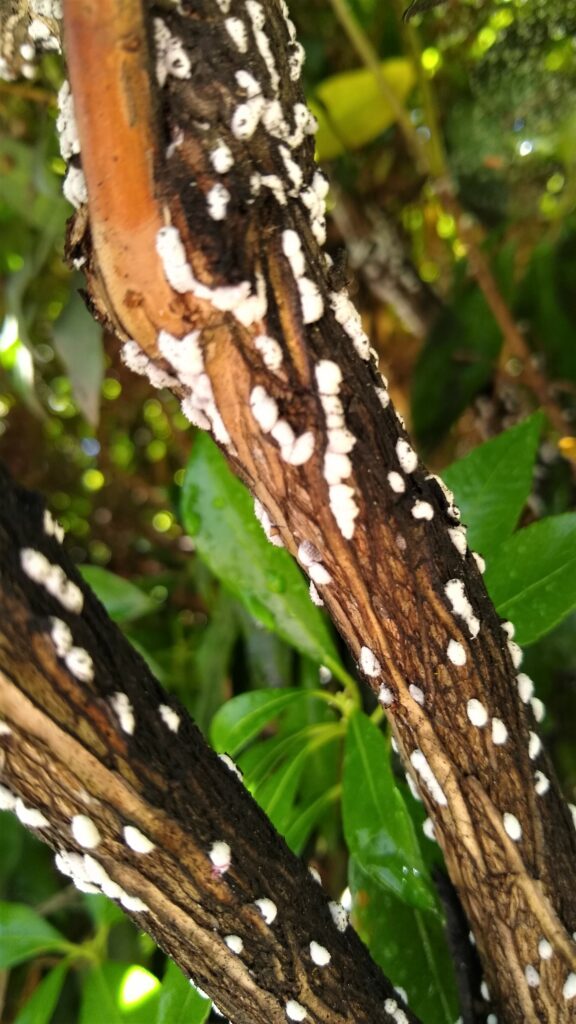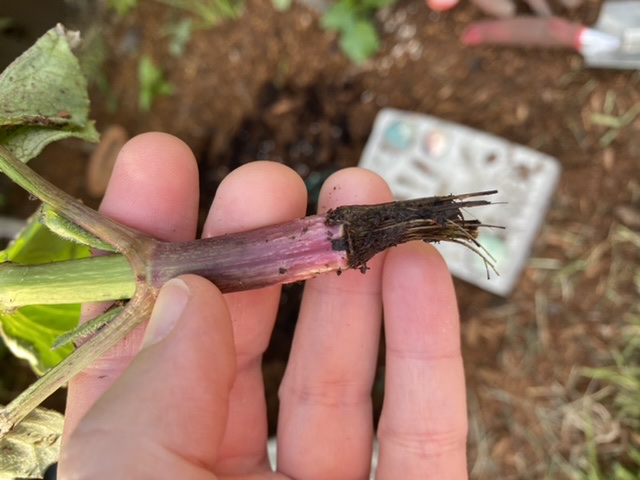Inquiries from Ask Extension
Jean R. Natter, OSU Master Gardener
Houdini fly in Multnomah County? (Multnomah County; 2021-04)
Q: We noticed these flies in our mason bee tubes. After some googling we think it might be a Houdini fly. Is this something that needs to be reported? Are there steps we need to take to help the bees?

A: Thank you for the excellent images of the Houdini Fly, Cacoxenus indagator, recently identified as a serious, exotic insect pest of Mason Bees.
Here’s a pest alert about the Houdini Fly with good images, plus suggestions for people who keep mason bees. See “Houdini Fly Found in Washington” – https://agr.wa.gov/departments/insects-pests-and-weeds/insects/apiary-pollinators/pollinator-health/houdini-fly
This website provides additional details about protecting your Mason Bees: https://crownbees.com/houdinifly.
Because the flies move slowly, you’ll be able to collect several samples to submit for ID. Refrigerate them in a small covered container until submitted. (Feel free to crush any extra flies you may discover later.)
I suggest you report the flies to the Invasive Species Hotline; call 1-888-468-2337 or use their online form at https://oregoninvasiveshotline.org/reports/create.
Overrun by little moths! (Lane County; 2021-05)
Q: The east-facing side of my Coburg, OR, home has hundreds of little moth-like bugs lighted on it. They started to appear in early April, when the weather started warming up. Can you tell me what they are, and how I can control their population?
A: The small insects are called Drain Flies, a Psychoda species. Other common names for them are Moth Flies and Filter Flies.
Drain Flies are most commonly found indoors near moist areas, such as sinks, wet-mops that have been wet for several days, or in damp basements. These flies are poor fliers and are often found near their source.
Potential sources outdoors include a nearby area that remains moist for an extended period. Places to investigate as a source include roof gutters clogged with debris, at the base of downspouts, a wet spot near a leaking spigot, moist compost, and/or dirty garbage cans.
Drain flies are considered to be nuisance pests because they don’t cause damage to people, their pets or belongings. The remedy is to locate and eliminate their source. No pesticides needed. A wet-dry shop-vac could help decrease the number of the adults but will do little as long as the moist breeding site remains.
White Egg Like Spots (Clackamas County; 2021-05)
Q: What are these white egg-like spots on my bush?

A: Azalea Bark Scale are small sucking insects which can cause their most common victims — Azalea, Pieris (Andromeda), and Rhododendron — to slowly decline over an extended period of time. (Certain other shrubs may also be affected, but far less often.)
You can physically attack those small beasts by rubbing them off with a toothbrush.
Then, because you’re very likely to miss the small, newly hatched larvae (youngsters), follow-up with a commercial Insecticidal Soap Spray, diluted according to label directions. Coat all surfaces of the stems and branches thoroughly, front and back, top and bottom. Then repeat the spray, as needed, through the following months.
Woolly aphids on Old Apple Tree (Multnomah County; 2021-05)
Q: Our old apple tree has wooly aphids, how can this be treated!
A: Woolly apple aphids, Eriosoma lanigerum, are impossible for home gardeners to eradicate. The reason? The main colony of woolly apple aphids are on the tree’s roots whereas only some move to the top growth every spring. The result of an infestation is a gradual decline in tree vigor. In spite of that, fruit yields are often large enough for a family’s use.
Our official Insect Management Handbook says “This aphid is considered a minor pest in the PNW. If colonies are found on trees, they can be physically removed. Many Geneva and Malling-Merton rootstocks are resistant.”
You can limit the damage somewhat by spraying commercial insecticidal soap, prepared according to label directions, directly on the woolly aphids you find on the bark, then repeat as need through the growing season. Other pesticides that might be considered are rated as “highly toxic to bees.”
No pesticides are available for soil treatment.
In commercial apple orchards, woolly apple aphids would be avoided by not planting susceptible kinds of apples. You might consider planting a new apple with one of the resistant rootstocks mentioned above.
2nd Q: We’ve just tried some Safer Insecticidal soap and will reapply again tomorrow.
Last year the tree produced lots of apples, this year we see very few coming. Will these aphids harm surrounding plants?
2nd A: Woolly apple aphids are specific to apple trees. They won’t damage other plants.
It’s unlikely you’ll need to use insecticidal soap daily. Limit its use to when you see new aphids, then spray only the fresh white specks.
This year’s small crop may be a normal event because apple trees tend to “alternate bear.” That is, after they produce a huge crop, the following year they’ll produce a small crop.
But, there’s a simple trick to even out production one year to the next. It’s called thinning.
To thin, when the fruit is thumbnail-sized, remove the excess to a reasonable number. In general, the goal is to keep only one fruit per cluster. However, if what remains may be too heavy a load for the branch at harvest, remove even more of the as yet undeveloped fruits.
The result of thinning? Even though you’ll have fewer apples at harvest, they will be large for their kind and high quality.
ID what ate my dahlia? (Multnomah County; 2021-05)
My dahlia was about 8 inches tall and had a quick death, did some digging and found these little white worms around the stem looks like they ate it. What are they? What’s the best way to get rid of them?
A: Thank you for attaching the images. The 1st image (white larvae and wet soil) and the 3rd (rotted stem) are the most telling.
It’s very likely the stem rotted from excessively wet soil, then the larvae came in to clean up the debris. It’s also likely that the tuber is also rotted.
After dahlias begin growing in the spring, they do well with moderately moist soil.
See Dahlia Culture — https://catalog.extension.oregonstate.edu/sites/catalog/files/project/pdf/fs95.pdf


